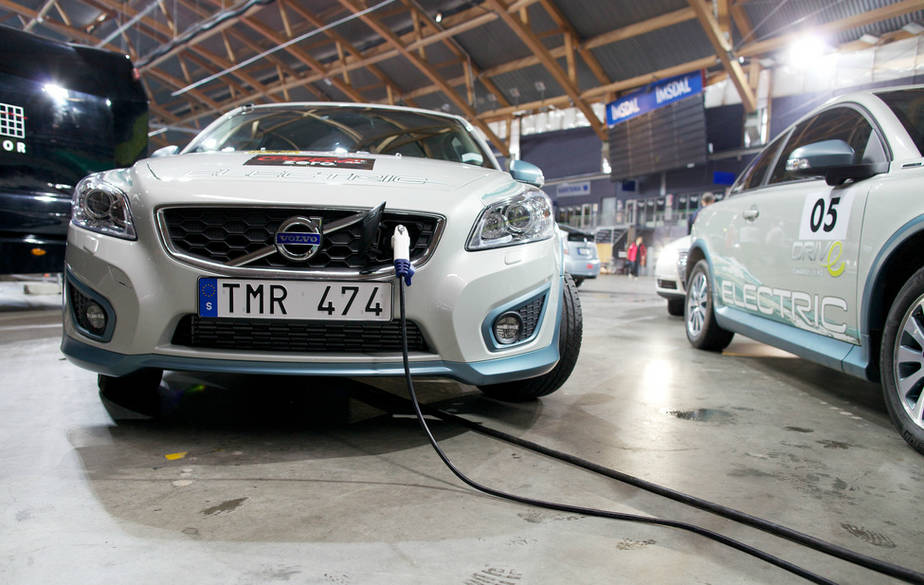Electric Cars Will Outsell Gas Competitors by 2040, BNEF Says
Volvo this week announced that all of its new vehicle models would be electric or electric hybrid starting in 2019. Credit: Zero Emission Resource Organization/CC-BY-2.0
In less than 25 years, a majority of the new cars rolling off of dealership lots will be powered by electricity, according to a report out Thursday—a prediction that outpaces previous forecasts and stokes hopes that climate-warming tailpipe emissions could be cut more substantially and more quickly.
The report comes as automakers and governments are already sending unmistakable signals that the internal combustion engine is headed for the blocks. Just this week, the Chinese-owned Swedish automaker Volvo surprised the industry when it announced that it would phase out conventional engines starting in two years, and the French government announced plans to end sales of gas- and diesel-powered cars beginning in 2040 as part of its commitment under the Paris climate agreement.
The Trump administration, meanwhile, has signaled that it could roll back vehicle emissions and efficiency standards, putting U.S. policy squarely at odds with global momentum and roiling the country's auto industry.
"The electric vehicle revolution is under way, and the only question in my mind is whether U.S. automakers will be leaders," said Roland Hwang, director of the energy and transportation program at the Natural Resources Defense Council. "With Trump saying he wants to cut economy standards, he's undermining the market. He's putting investments, jobs, technologies and the environment at risk."

The new report, from industry analysts at Bloomberg New Energy Finance, predicts that electric cars will represent 54 percent of all new cars sold in the world by 2040, up from the 35 percent the group predicted last year.
The surge is largely due to falling battery prices, which will help make electric cars cheaper to buy in most countries, starting in 2025, than conventional cars. By 2040, the report says, electric vehicles will displace 8 million barrels of fuel per day and increase global electricity use by 5 percent. The impact of that electricity use, the analysis said, will be minimized by cleaner power generation.
"If we're going to meet our climate goals, globally and nationally, it's imperative we move to electrification on a full scale," said Carol Lee Rawn, director of transportation at Ceres, a sustainable advocacy group that in March released a report showing that clean vehicle standards help boost U.S. automaker profits.
"Obviously, a lot turns on the grid, but the grid is getting cleaner, and it's a positive thing for climate," she said.
Falling battery prices help drive change
The huge drop in lithium-ion battery prices is largely behind Bloomberg's projections. Since 2010, prices have fallen 73 percent per kilowatt-hour, and Bloomberg analysts say those prices will fall another 70 percent by 2030.
That means that even if oil prices stay low, 67 percent of new cars sold in Europe, 58 percent in the U.S. and 51 percent in China—the largest electric vehicle market now—will be electric, the report's authors said.
Last year saw a record high in electric vehicle sales of 700,000. That will rise to 3 million a year by 2021, accounting for 5 percent of light vehicle sales in Europe and 4 percent in the U.S. and China, the report said. Electric vehicle sales are forecast to increase quickly after that.
"If we want to solve global warming, these are the numbers we need to hit," Hwang said.
In U.S., policy change is the wildcard
The analysis assumes no major policy changes, however, and the picture in the U.S. is unclear.
In March, President Donald Trump announced that he would order the Environmental Protection Agency to review the tough emissions standards put into place at the end of the Obama administration. Those standards sought to halve carbon dioxide emissions from tailpipes to 163 grams per mile by 2025. (That translates to a fuel efficiency goal of 54.5 miles per hour, fleet-wide.)
Some American auto companies complained they would be unable to meet the standards, and Trump responded, saying in March at an event in Michigan: "The assault on the American auto industry is over." Many environmental groups see the review as a precursor to rolling back the standards, but it's not yet clear what will happen.
The Trump administration, with EPA Administrator Scott Pruitt leading the way, also appeared poised to attack California's more stringent emissions standards, which are allowed under a waiver system enshrined in the Clean Air Act. The state's emissions law requires car makers to sell a certain about of "zero-emission" vehicles, helping the state drive electric vehicle sales. California, which has a history of implementing rigorous efficiency and emissions standards, often serves as a model for other state programs—making it a focus for the auto industry and its political and oil-industry allies.
Pruitt told a Congressional budget panel last month that the waiver was "not under review." But the EPA has until April of next year to determine if the federal standards, based on a determination made by the Obama administration, are "appropriate." "If the agency believes that the final determination issued by the previous administration is not realistic, it would submit a new proposal for public comment," the agency said in March.
"This is a very risky time for the U.S. auto industry," Hwang said. "The regulatory signals are very muddied, but at the same time the global signals are very clear. The U.S. auto industry risks becoming an island."